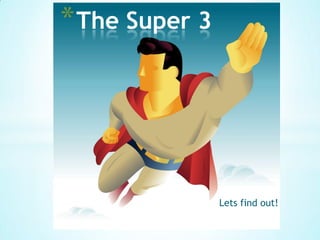Recommended
More Related Content
Similar to The super 3
Similar to The super 3 (20)
Learners and Learning: Section Two: Learning to know what we don’t know

Learners and Learning: Section Two: Learning to know what we don’t know
P.E.-PPT (1).pptx Physical Education_grade 12_2nd semester

P.E.-PPT (1).pptx Physical Education_grade 12_2nd semester
Retrospect it! a simple recipe for building fun agile retrospectives

Retrospect it! a simple recipe for building fun agile retrospectives
The super 3
- 1. The Super 3 Lets find out!
- 2. What is the Super 3? The Super 3 are three steps that we can follow to make finding information easier! Step 1: PLAN Step 2: DO Step 3: REVIEW
- 3. Step 1: PLAN Before you start anything ask yourself… What am I supposed to do? What will it look like if I do a really good job? What do I need to find out to do the job?
- 4. Step 2: DO When you are DOING the activity think about the questions you asked in step 1!
- 5. Step 3: REVIEW Review means to check over your work. Ask yourself… Did I do what I was supposed to? Do I feel good about my work? Should I do something else before I turn it in?
- 6. Let’s sing it! Sung to the tune of “Bingo” Here is a process I can use,Its name is Super3-0! Plan, do, and review;Plan, do, and review;Plan, do, and review;Its name is Super3-0!
- 7. Lets try it! Think about your favorite rainy day game or activity. Use the Super3 to share it with other kids by following the directions.
- 8. Tell what kids will do. This is like the main idea of the game Example: Make and learn to play a fishing game Tell what they need to find out about in order the make and do the activity. Example: You need to find out what materials I need and how to make the game pieces. You need to learn the rules of the game Step 1: PLAN
- 9. List materials that kids will need to gather. Materials that are found around the house work best. Write a list of instructions for making the game or doing the activity. Step 2: DO
- 10. Step 3: REVIEW Now instruct the kids to play the game or do the activity. Ask them questions to make sure that they have done it right. Give them some ways to change or make the activity different the next time they do it. Lesson from http://www.big6.com/kids/site
